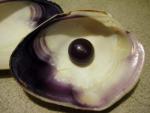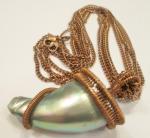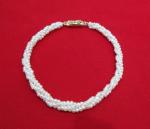Saudis plan $200m pearl farm, fuel plant in Western Australia
A Saudi Arabian company plans to invest $200 million in WA to create a huge pearl farm and biodiesel production plant off the coast at Port Hedland.
Fisheries Minister Norman Moore is considering whether to give the Middle Eastern firm the go-ahead to grow and harvest millions of pearls and make 400,000 tonnes of algaederived fuel a year in the Indian Ocean.
The majority of the pearls and shell meats produced would be exported to Asian markets. Jeddah-based Technology System Trading hopes that the massive operation will become a tourist attraction to rival Broome’s Willie Creek Pearls.
The ambitious plans are seen as crucially important to diversify industry in the Pilbara as WA’s mining boom comes to an end.
Read entire article here.
Join in and write your own page! It's easy to do. How? Simply click here to return to Pearl News.
Overproduction takes shine off Chinese pearls
by Rujun Shen
SHANGHAI (Reuters) - The prices of the lustrous strings of pearls that line display cases in Shanghai jewellery stores are more eye-catching than the glossy gems: some pearl sets cost under 10 yuan even before bargaining.
"All kinds of people come to buy pearls, Chinese and foreigners," said Wang Caijiao, who has been selling pearls in a two-storey shop on Shanghai's bustling Nanjing Road for seven years.
The massive volume of freshwater pearls on the market have made the gem affordable to the masses.
That might be good news for the migrant labourers and factory workers who can now afford pearls but it is bad news for the pearl industry which frets over the sinking prices of pearls and the damage to the gem's once exclusive image.
Read entire four page article here.
Join in and write your own page! It's easy to do. How? Simply click here to return to Pearl News.
Cook Islands Discuss Future of Pearl Industry
by .radioaustralia.net.au
The future direction of the Cook Islands' revived pearl industry is to be defined at a two day national forum in Rarotonga.
Our reporter, Ulamila Wragg, says the Cook Islands Pearl Authority, set up two years ago to revive an ailing industry, is hosting an open forum with pearl farmers, retailers, exporters, jewellers and other stakeholders aimed at setting road map for the industry.
A report on strategic marketing plans put together by New Zealand consultants Brian Richards and Mike Hodges will be the centre of discussions.
Read entire article here.
Join in and write your own page! It's easy to do. How? Simply click here to return to Pearl News.
New Akoya Pearl Farm in Australia
Broken Bay, just north of Sydney, has a commercial history farming rock oysters, spanning more than a century.
But now four Sydney rock oyster growers at Broken Bay are bringing their collective farming experience to a new commercial pearl operation, headed by Ian Crisp.
"I don't think we as a group would have been able to achieve this if we hadn't had our oyster farming experience," Mr Crisp said.
Broken Bay Pearls general manager Peter Clift says farming Akoya pearls is much the same as growing Sydney rock oysters.
Read entire article here.
Join in and write your own page! It's easy to do. How? Simply click here to return to Pearl News.
Fiji a suitable destination for pearl farming
Fiji is a suitable destination for pearl farming however it may get tougher to keep the business running.
Savusavu based J Hunter Pearls which has been specializing in pearl farming for a number of years said times are getting tougher now.
Read entire article and get a link for audio here.
Join in and write your own page! It's easy to do. How? Simply click here to return to Pearl News.
Wales Investigates Pearl Culturing Possibilities
THERE was a time when Welsh rivers were rich with natural pearls.But in recent years illegal poaching, pollution and river engineering have made the freshwater gems a rarity.
Now research work by Swansea University aims to safeguard the most endangered and puzzling aquatic species, the freshwater pearl mussel.And it is possible the research could eventually lead to Wales having its own cultured freshwater pearl industry.
Lead researcher on the project, Gethin Rhys Thomas, 25, of Ammanford, of the university’s school of the environment and society is working with Dr Carlos Garcia de Leaniz, a senior lecturer in the department of pure and applied ecology to look at ways of preserving what is regarded as one of Wales’ natural treasures.
Mr Thomas said: “Surprisingly few people are aware that there are freshwater pearl mussels in Welsh rivers, or that they are now possibly the most endangered aquatic organisms anywhere in the world.”
Read entire article here.
Read entire article here.
Kari eats at a Welsh Street Cafe
Kari's Welsh Rarebit Recipe
Stone Animals Guard Cardiff Castle
Street Preacher Shouts in Cardiff
Join in and write your own page! It's easy to do. How? Simply click here to return to Pearl News.
Pearl farming in China loses its lustre as global prices dive
by Jane Macartney
(Shanxiahu )
Autumn is pearl harvest season and the roadsides around Shanxia Lake are heaped with mounds of mussels stripped of their bounty.
The pearl growers of China are, however, unhappy. From the workers handpicking treasure from the flesh of freshly netted mussels to the girls in high heels hawking the lustrous gems in city boutiques there is a shared concern: the financial crisis.
Nine out of ten pearl necklaces in the world originate in this fertile corner of southeastern China where production has multiplied over the past decade to swamp the world with pearls. Now the good times are gone. Qian Wenhao switched from fish farming to pearl cultivation more than 15 years ago. Squatting on a concrete block in the yard of his house, he split open a mollusc with a chopper to reveal its creamy flesh hiding a dozen or so rounded lumps. He dug his fingers through the meat and extended a palm filled with gleaming pinkish spheres.
Read entire article here.
Click here to read or post comments
Join in and write your own page! It's easy to do. How? Simply click here to return to Pearl News.
Tennessee Pearls Still Command Attention
by Kevin Cowan
The simple message on the sign outside Pardon's Jewelers on Broadway seems like a blast from the past.
"TENNESSEE PEARL RINGS PENDANTS EARRINGS," it says.
The North Knoxville store is one of the few places in East Tennessee that still carries baubles made with the state gem. That's a far cry from when the freshwater pearls really came out of their shell, becoming a hot fashion items in the '80s.
"Back then, we had several women, who instead of a diamond engagement, would get a Tennessee pearl," said Bill Pardon, who runs the shop. "During the World's Fair, we made jewelry for people who sold it. It was very popular."
It was in 1982 when the store was opened at its current location by Bill's father, the late Carl Pardon, who operated the jewelry store out of the basement of his Chicamauga Avenue home for years. Tennessee pearls were one of the main attractions those days, along with coin jewelry.
Read entire article here.
Join in and write your own page! It's easy to do. How? Simply click here to return to Pearl News.
Female Pearl Farmer -- A Passion for Pearls
by Elizabeth Marcellino
The unadorned door of Suite E in a small, stark, garden office building in California gives nothing away. Neighboring offices house several construction companies, a small nonprofit and a property management group. But Suite E, nearly as modest inside as out, holds great beauty. Tahitian pearls, in an astounding range of hues, and in varying sizes and shapes, are tucked away here, held for the U.S. retail customers of Dora Fourcade Designs.
Dora Fourcade is a surprise in her own right. A petite, pretty, dark-haired woman, dressed for business and exuding an air of competent professionalism, she is in fact a farmer. A native-born Tahitian, she owns and manages one of the largest pearl farms Aratika, an atoll about 300 miles northeast of Tahiti, though she lives in Pacific Palisades. Subject to many of the same threats as any farmer?inclement weather, parasites, and global pricing pressure?she seems to take the risks in stride. ?It?s labor intensive and you never know,? Fourcade says as she talks about production rates.
She?s managed the farm on her own since 1997, when she bought out the shares owned by her brother, Jean Pierre. Taking over as sole owner of an island farm 4,000 miles away should have been transition enough for Fourcade, who moved from Mandeville Canyon with her two young children. But she also had to prove herself competent to skeptics who were particularly doubtful about a woman running the show.
Read entire article and see a photo of Dora here.
Join in and write your own page! It's easy to do. How? Simply click here to return to Pearl News.
33 Pearl Cultivators Close Down
As many as 33 out of 36 pearl cultivators and exporters in West Nusa Tenggara (NTB) have practically stopped operating this year due to the plummeting price of pearls on the international market as the result of the global financial meltdown.
Pearl production has dropped drastically from the average of 1.2 tons annually to only 200 kilograms this year.
"Only three companies remain active due to plummeting pearl prices, while the other 33 companies are only operating for the sake of covering operational costs and employees' salaries," said NTB Maritime Affairs and Fishery Office head Ali Sahdan in Mataram on Saturday.
He added the plummeting pearl prices from the start of the global economic crisis had yet to be corrected.
Read entire story about 33 pearl cultivators closing down in Indonesia here.
Join in and write your own page! It's easy to do. How? Simply click here to return to Pearl News.
Perles de Tahiti Under New Management
by Gary Roskin, FGA, G.G.
Martin Coeroli is leaving GIE Perles de Tahiti, the nonprofit public relations and economic interest group for the international promotion of Tahitian cultured pearls.
“I am quitting Perles de Tahiti to work for the government of French Polynesia,” writes Coeroli, the former general manager of the organization. Coeroli reportedly has been offered a job as minister of the environment.
Coeroli had been a strong proponent of marketing the top end of the Tahitian pearl harvest, but fewer top-quality pearls are produced now compared with the remainder of the production. In a statement, GPT said the pearl producers on its board of directors are “worried by the persistent slumps of their goods, just as by the recurring fall of its trading price.”
Read entire article here.
Join in and write your own page! It's easy to do. How? Simply click here to return to Pearl News.
China's Pearl Farms Prospering
by Royston Chan
(uk.reuters.com)
ZHUJI, China (Reuters Life!) - For decades, the clean waters of Zhuji have fed China's rise to the world's top producer of freshwater pearls and now they are helping to turn this eastern city into a global trading hub for the lustrous gem.
The rivers and ponds of Zhuji are protected from the farm and factory wastes that foul much of China's prosperous east coast, and now its family-run pearl farms are being steadily replaced by companies that cultivate and distribute their produce worldwide.
"I have been working in this industry for more than 20 years, nearly 30 years," said Wu Zhiyuan, a 52-year-old pearl farmer who tends freshwater mollusks in a lake in Zhuji.
Read entire article here.
Join in and write your own page! It's easy to do. How? Simply click here to return to Pearl News.
Kamoka Pearl Farm
Have You ever wondered what it would be like to work in paradise as a pearl farmer? Thanks to Kamoka Pearl Farm, we get a glimpse into a day in life of a Tahitian pearl farmer. Could this be the best job in the world? Is pearl farming right for you? Watch the video, then decide.
See video about pearl farming at Kamoka Pearl Farm.
Join in and write your own page! It's easy to do. How? Simply click here to return to Pearl News.
Fiji Pearl Farms Get a Boost
Pearls from Fiji are catching up in marketability, says Permanent Secretary for Fisheries Viliame Naupoto.
Pearl farming will be getting a boost next year after Government announced a three per cent reduction in fiscal duty for materials used in pearl farming.
As part of customs concession under Section 10 of the Customs Tariff Act, ropes used in pearl farming, floats, mono filaments, spat collector lines, protective plastic mesh, panel and pocket nets have had fiscal duty reduced.
This also includes scientific equipment such as bag filter vessel and bag filters, UV steriliser and chemicals for hatchery.
Read entire article here.
Join in and write your own page! It's easy to do. How? Simply click here to return to Pearl News.



